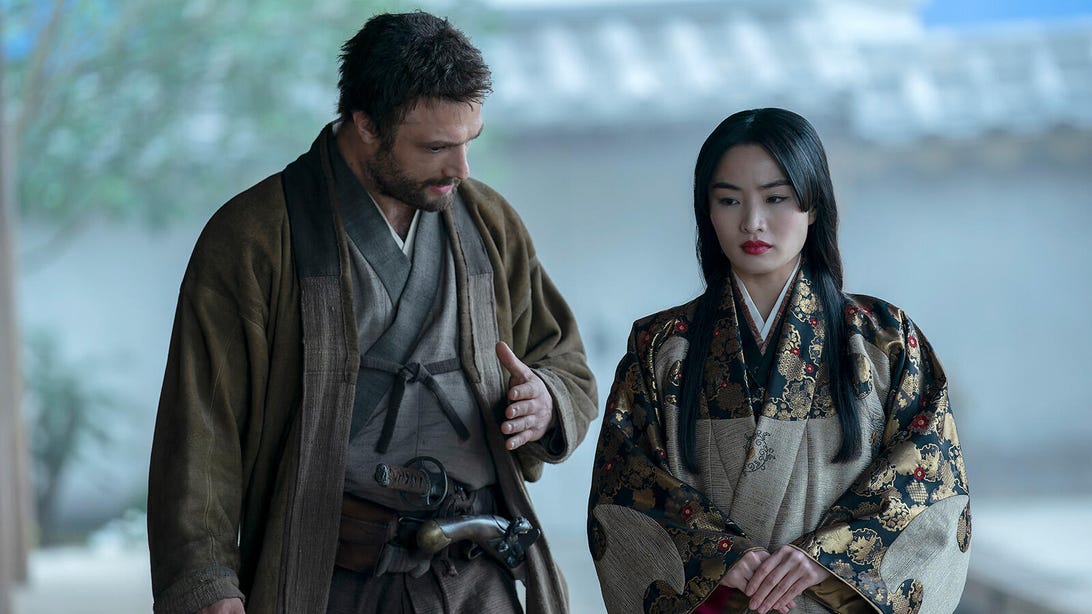Join or Sign In
Sign in to customize your TV listings
By joining TV Guide, you agree to our Terms of Use and acknowledge the data practices in our Privacy Policy.
Shōgun Creators Explain That Major Change From the Book in Episode 9
Justin Marks calls Blackthorne's decision 'the ultimate gesture of love, of alliance'

Cosmo Jarvis, Anna Sawai, Shōgun
FX[The following contains spoilers for Shōgun Episode 9, "Crimson Sky." Read at your own risk!]
In James Clavell's novel Shōgun, Lady Mariko prepares to commit seppuku — a Japanese tradition of killing oneself honorably. She had tried to leave Osaka castle to meet Lord Toranaga as part of her duty to him, but Lord Ishido's men stopped her. Ashamed by her failure to oblige Toranaga, Mariko gets ready to end her life. This scene in FX's Shōgun, an adaptation of Clavell's book, unfolds in Episode 9. But while Mariko's (Anna Sawai) journey to the moment she is about to cut her belly is similar to what happens in the original text, there is one major departure. Whereas in Clavell's Shōgun, Mariko asks Yabu — the character Kashigi Yabushige (Tadanobu Asano) is based on — to be her second, in the FX series John Blackthorne (Cosmo Jarvis) steps up to be the one to decapitate her.

Click through for our guide to spring TV
"It's a very loaded and layered scene with a bit of invention beyond the book," Shōgun co-creator Justin Marks told TV Guide. "That was a choice that was made in large part because we wanted to reflect what it was to be an ally and an advocate in maybe a more modern lens."
Marks shared about how Blackthorne's decision targeted the religious dimension of the story. The British pilot is Protestant, while Mariko is Catholic. In both the novel and the series, Mariko asks Lord Kiyama — a Christian member of the Council of Regents — to be her second. Without someone decapitating her, Mariko's Catholicism leads her to believe that she would not go to heaven for ending her own life. Kiyama does not appear for that role in either iteration of the story, and in the show Blackthorne volunteers after taking in the lord's absence. "Even though [Blackthorne] doesn't agree with her Catholicism, even though he traveled all the way around the world to fight against this church, for her sake, he's willing to believe in her faith system," Marks explained. "So he will stand behind her and make it so that it's not suicide and she could still go to heaven."
Shōgun's Tokuma Nishioka Says He Cried for 'About 3 Hours' Filming That Shocking Episode 8 Scene
Series co-creator Rachel Kondo, who wrote "Crimson Sky" with Caillin Puente, expanded on the change from the novel. "We all decided as a room it was a point of invention that him doing this is the ultimate statement that he had evolved enough to say, let me do an act of love for the woman that I deeply respect," Kondo said. "That means, let's get myself out of the way and let's not do the thing that I most want, which is for her to live."
Jarvis shared about his character's inner turmoil during the scene. "Blackthorne despises unnecessary violence, one of the challenges was trying to figure out the intricacies of [his] relationship to unnecessary violence," Jarvis said. "Obviously Mariko's Catholic and suicide is not good, and so Blackthorne had to come to terms with his own relationship to God in order to prioritize Mariko's relationship to her God."
Shōgun's Anna Sawai Wanted a Role That Scared Her. She Found It in Toda Mariko
At the same time, Mariko was fighting her own battle. "She has that dual consciousness of being a Catholic but also serving her Japanese Lord," Sawai explained. "And in that scene, I think she understands that her purpose in life is to serve the [Japanese] Lord and that is what her father wanted her — for her to finish his battle." Mariko is the daughter of the disgraced Akechi Jinsai, who had been branded as a traitor. For her, changing that legacy through an act of loyalty to Toranaga (Hiroyuki Sanada) was most important. "She has her whole family's lives and their purpose in her hands," Sawai said. "It was just so heavy."
Blackthorne's decision to be her second appeared to provide solace. "He believes in what she's doing," Kondo said. "And to me there's no greater gesture of large-heartedness than to just simply believe in a person."
And while earlier on in the episode Blackthorne did ask Mariko to consider living "for him," in the moments before her seppuku — which was stopped by Lord Ishido — he stood behind her choice. "To demonstrate his support for her in those final moments I think was the ultimate gesture of love, of alliance," Marks said.
Shōgun Review: FX's Historical Limited Series Is a Complex, Breathtaking Spectacle
New episodes of Shōgun air Tuesdays at 10/9c on FX and stream the same day on Hulu.
